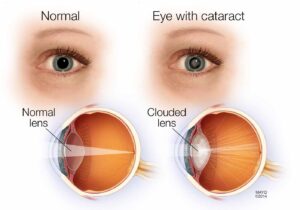Is Cataract Surgery the Only Way to Treat Cataracts?in Boston, MA

Do you have cataracts and aren’t sure what to do about them? You’re not alone because they are one of the most common age-related eye conditions you can develop.
By age 75, half of all adults have or have had at least one cataract. Unlike some other age-related eye conditions, the good news is that you can fully reverse the vision loss due to cataracts.
But the only way to treat them is by having cataract surgery. Cataract surgery is the only effective treatment for patients with cataracts. If you have cataracts and have experienced any of the symptoms of this condition, like blurry vision or glare around lights, you’ll need to think about when to have cataract surgery.
Keep reading to learn more about cataracts and cataract surgery!
What are Cataracts?
Cataracts form when the natural lens of the eye becomes cloudy. When this occurs, you may develop symptoms like:
- Blurry vision
- Light sensitivity
- Intense glare and halos
- Poor night vision, especially while driving
- Difficulty distinguishing contrast

The most common reason cataracts form is aging, but cataracts can also develop for other reasons, like long-term corticosteroid use or an injury to your eye. A cataract usually develops because of proteins in the lens that clump together, making it more challenging to see over time.
This change to the composition of the lens happens slowly over time, and it may take years or decades before any changes to your vision become noticeable. Because of how slow they develop, it can sometimes be tough to attribute visual problems to cataracts.
It’s helpful to have your cataracts diagnosed in the early stages so you and your eye doctor can keep track of their progression. Having regular eye exams ensures your eye doctor can spot cataracts and other age-related eye conditions in the early stages, so it’s essential to keep up-to-date with your annual appointments.
The best way to treat cataracts once you know you have them is through cataract surgery, but you may not need to have them treated right away.
What are Your Treatment Options if You Have Cataracts?
The only way to treat your cataracts is to have them removed during cataract surgery. But ophthalmologists and cataract surgeons only recommend you have them removed when they begin to affect your quality of life.
Because they develop so slowly, they may not cause any visual issues while they are still small. You may not notice that your vision seems any different until you’ve had cataracts for several years or more.
You can also counter more of the milder symptoms of cataracts by making simple life changes. When they’re in the early stages, stronger prescriptions and direct light can help you see better.
But eventually, having a stronger prescription for your glasses or contact lenses will no longer help correct your vision, and you’ll need a permanent option.
One good indication that it’s time for cataract surgery is if you have trouble driving at night. Driving at night can be dangerous for people with advanced cataracts, between having a hard time seeing in low light and the increased glare from headlights.

If you have to stop driving at night for your safety, it’s probably time to at least consider when you’ll have cataract surgery. Another sign that you may want to think about having cataract surgery is if you’re no longer able to participate in your favorite hobbies, like knitting, reading, or hiking, because you can’t see.
If your quality of life is starting to suffer, cataract surgery can give you your clear vision back.
Having Cataract Surgery

Because cataracts are so common, so is cataract surgery. Cataract surgery is one of the most commonly performed medical procedures in the country. At the Nielsen Eye Center, our cataract surgeons often perform laser-assisted cataract surgery on patients to ensure everyone has the best possible results.
Laser-assisted cataract surgery uses a laser instead of instruments with blades, leading to less precise results and longer recovery times for patients. Our cataract surgeons have an extensive amount of experience performing this procedure. The cataract surgeons at the Nielsen Eye Center can still perform standard cataract procedures as an option.
Cataract surgery is also a very safe and minimally invasive procedure. With few risks for complications, it’s safe for cataract patients. That includes patients with other eye conditions like glaucoma if a MIGS procedure like iStent inject is performed simultaneously to lower eye pressure.
Cataract surgery is an outpatient procedure, meaning you don’t have to worry about staying in the hospital after having your cataracts removed. Instead, you get to go home the same day!
From start to finish, the procedure usually only takes about a half-hour. If you have cataracts in both eyes, you’ll have one cataract removed at a time. This is often several weeks later for most patients, but it depends on the individual to ensure that you’ve healed and can see.
During the procedure, you’ll first have your eyes numbed using special eye drops. There’s no need for general anesthesia or an injection.
Then, your surgeon will make a tiny incision in the eye using a laser. Because this laser is used, your surgeon can plan and customize every surgical step down to the incision by using your unique eye measurements.
After creating the incision, they’ll use the laser to break up your cataract into smaller, soft pieces using the least amount of energy when removing it. Breaking down the cataract and the natural lens allows patients to recover more quickly and have less inflammation and swelling as they recover.
The natural lens is then replaced with an artificial lens, called an intraocular lens (IOL), inserted into the eye. Undergoing laser-assisted cataract surgery also allows the use of premium IOLs.
Recovery after cataract surgery is quick, and most patients can return to normal activities within a few days, with full recovery after a few weeks. Having cataract surgery is well worth seeing clearly again without the hindrance of cataracts, and it can even help you see better than you’ve ever seen before if you, and your cataract surgeon choose a premium lens at the Nielsen Eye Center.
IOLs

Many patients with cataracts also have presbyopia, another age-related condition common in patients over the age of 40. Presbyopia makes it harder to see up close, making it necessary to use reading glasses.
Presbyopia occurs when the lens loses its flexibility due to aging. If you’re tired of reading glasses and want to reduce your dependence on glasses and contacts after cataract surgery, a premium IOL may be the way to go. Many of these premium IOLs correct presbyopia and astigmatism if you choose a toric version of the lens.
Having cataract surgery can restore your vision and help you see with clarity and even more detail. While it’s the only way to treat your cataracts effectively, it’s a procedure that’s undoubtedly worth having, and you should strongly consider cataract surgery if your cataracts make it hard to perform your daily activities.
Are you wondering if you should learn more about cataract surgery? Schedule a cataract consultation at Nielsen Eye Center in Boston, MA! Just call 877-373-2020 and tell them you want a cataract consultation.
With our Patient Advocates waiting by the phone, there’s never been a better time to find out more about cataract surgery than right now! They are here to answer any questions you may have, so call and have your concerns alleviated!



